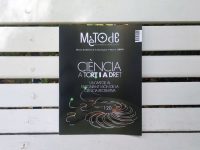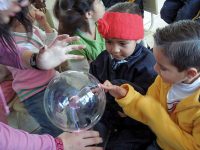
 Pcture: Wikimedia Commons The Flaming Lips shows stand out for their spectacular nature. The band uses spatial exploration and other scientifics motifs in their shows. A spacecraft landing on the stage in the picture. |
||
|
The image of the scientist in a white coat is deep rooted in our collective imagination, just as many other stereotypes Hollywood spreads in its films. Just in case, I’ll make an obvious remark: outside Hollywood’s fantasy world, most scientists do not wear white coats —why should a mathematician or an astronomer? Therefore, it is an unrealistic misconception. This stereotype is closely linked to yet another misconception: scientists live on a different level —a higher level— of reality, their knowledge is unreachable for the rest of mortals, and their purpose in life is saving the world —or destroying it, depending on who is telling the story. The Flaming Lips, the extravagant Oklahoma band, opted for the former and bestowed upon science a salvific mission in their song Race for the Prize, included in their ninth album The Soft Bulletin (Warner Bros, 1999). In this song, two scientists face great dangers in an under pressure environment «for the good of all mankind». A kind of superhero who —I’d bet my life on it— wear white coats even at the super market. Race for the Prize depicts an idealised science, guided by hope and goodness and, therefore, aseptic, neutral and altruistic. Its main characters («They’re just humans/ With wives and children») let themselves be carried away by an unselfish attitude and an absolute dedication while their fate is to shape the future beyond their will. This is a clichéd perspective we need to be careful with, especially taking into account the band’s career. The song had some important repercussions at the time, and this is why the band La Costa Brava decided to translate it into Spanish and include it in their album Déjese querer por una loca (Grabaciones en el Mar, 2003) and named it Dos científicos (Carrera por el premio) (Two scientists (Race for the Prize)). The Spanish version still has an epic vibe about it, however, it shows a bitter face: the titanic task carried out by the two scientists won’t be acknowledged in their lifetime («They’ll reach the top when they are dead, far away»). An observation that, sadly, matches reality more accurately and leads us to think about other super heroes that, with or without white coats, work for a better future while official science seems to be taking different directions. |
|
«In Race for the Prize, two scientists face great dangers in an under pressure environment “for the good of all mankind”» |
 Picture: Christmas on Mars Picture: Christmas on MarsFar from avoiding the Martian stereotype, the Oklahoma band has chosen to exploit it. In the picture they are disguised as aliens starring in Christmas on Mars, co-directed by the band’s lead singer Wayne Coyne. |
«The Flaming Lips combine lysergic experiences with the fantasy of working for NASA, probably the most visible scientific institution in contemporary pop music» |
|
|
Metaphysics in outer space If we look at things from a different perspective and research what people say about The Flaming Lips we’ll find that they are often referred to as Martians. Far from avoiding this stereotype, the Oklahoma band has chosen to exploit it (they even disguised as aliens to star in the film Christmas on Mars —Wayne Coyne, 2008—). In one of their latest spatial adventures, featured in their album The Flaming Lips and Heady Friends (Warner Bros, 2012), they worked together with Lightning Bolt on the song I’m working at NASA on acid, and even recorded a very extravagant video. This song combines lysergic experiences with the fantasy of working for NASA, probably the most visible scientific institution in contemporary pop music. Again, science is conceived as an almighty power («I’m working here and as I press the wrong button they’ll disappear»), but here the lyrics posses an existentialist tone and the main character wonders about the meaning of life in his workplace at the space agency. Astronomical language used metaphorically to talk about metaphysical matters is one of the most usual resources contemporary pop music uses. As the renowned science communicator Carl Sagan himself said: «The exploration of the cosmos is a voyage to self discovery», although The Flaming Lips’ worldview is closer to fantasy than reality. To listen: To watch: Felip Pineda. Editor at Mètode, University of Valencia. |
«Astronomical language used metaphorically to talk about metaphysical matters is one of the most usual resources contemporary pop music uses» |
|





